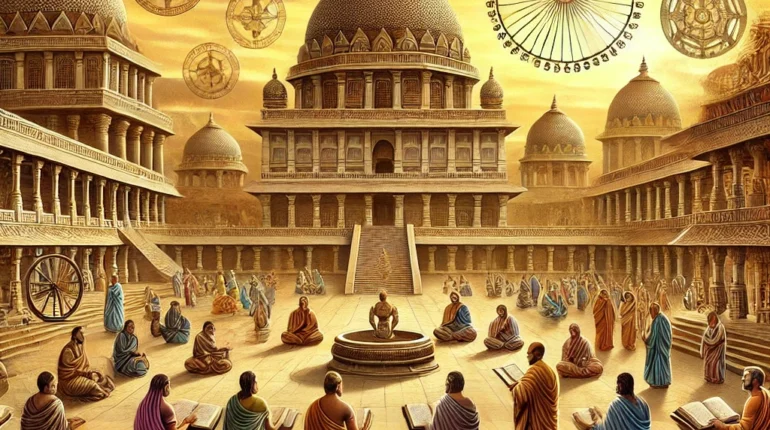
India has always been a land of unparalleled wisdom, innovation, and learning. Its ancient educational systems once stood as beacons of enlightenment, attracting scholars from across the globe. Universities like Takshila, Nalanda, Vikramshila, and Vallabhi were more than just centers of learning—they were crucibles of innovation that nurtured the brightest minds of their times. Sadly, much of this extraordinary legacy has been lost over the centuries, leaving behind fragments of what was once a treasure trove of knowledge.
Today, the Vishwa Sanatan Trust (VST) embarks on a monumental mission to reclaim and revive this forgotten heritage, ensuring that the wisdom of the past illuminates our path to the future.
The Golden Age of Indian Education
During ancient times, Indian universities were unparalleled in their scope and influence. Takshila, the world’s first university, thrived around 700 BCE, offering courses in medicine, law, astronomy, and more. Scholars such as Chanakya and Panini laid the foundations for economics and linguistics here. Similarly, Nalanda, established in the 5th century CE, became a symbol of academic excellence, with its sprawling libraries and thousands of resident students and scholars from as far as China, Korea, and Persia.
These institutions didn’t just impart theoretical knowledge; they emphasized holistic education, combining philosophy, science, mathematics, medicine, and the arts with moral and spiritual development. Their interdisciplinary approach was far ahead of its time, shaping individuals into well-rounded contributors to society.
What Was Lost
The decline of these institutions marked a tragic turning point in history. Invasions, colonialism, and societal upheavals led to the destruction of libraries, the burning of manuscripts, and the scattering of scholars. The razing of Nalanda by Bakhtiyar Khilji in the 12th century resulted in the loss of countless priceless texts. Colonial education systems further eroded the indigenous methods of learning, sidelining India’s rich intellectual traditions.
The loss of these centers of knowledge deprived the world of invaluable advancements in fields like astronomy, Ayurveda, architecture, and linguistics—insights that remain relevant even today.
The Timeless Relevance of Ancient Knowledge
Despite the ravages of time, the wisdom from ancient India continues to resonate. Concepts from Ayurveda and yoga have found global acclaim for their holistic approach to health and well-being. Mathematical innovations such as the concept of zero and advancements in astronomy underscore India’s scientific prowess. Vastu Shastra, an ancient architectural guide, and the philosophical teachings of Vedanta offer timeless insights for harmonious living.
Reclaiming this knowledge is not just about preserving history; it is about leveraging these teachings to address contemporary challenges like sustainable development, mental health, and ethical governance.
VST’s Vision and Efforts
The Vishwa Sanatan Trust is committed to reviving the essence of these ancient systems. Beyond Takshila and Nalanda, the Trust aims to unearth the wisdom of various lost centers of learning, compiling and translating ancient texts to make them accessible to modern audiences. This initiative aligns with the broader vision of creating a sustainable, knowledge-rich society.
One of the Trust’s cornerstone projects is the establishment of Vishwa Sanatan Dham, envisioned as a sanctuary of learning and innovation. Here, ancient wisdom will be integrated with modern educational practices, fostering a new generation of scholars who are both rooted in tradition and equipped for the future.
Reviving the Spirit of Learning
In a world dominated by rapid technological advancements, the revival of ancient Indian knowledge systems offers a much-needed balance. Integrating these timeless teachings with contemporary education can create a more holistic and ethical approach to learning. Imagine universities that teach not only artificial intelligence but also the ethical implications rooted in ancient philosophy; medical schools that incorporate Ayurveda alongside modern medicine; and architectural programs that combine Vastu Shastra with green technology.
This harmonious blending of past and present can pave the way for sustainable progress, ensuring that technological advancements are guided by wisdom and compassion.
A Call for Unity and Action
The revival of India’s ancient educational legacy is a task that requires collective effort. The Vishwa Sanatan Trust invites individuals, institutions, and governments to join hands in this noble mission. Whether through volunteering, funding, or spreading awareness, every contribution matters in reclaiming this heritage for future generations.
This is not merely about preserving history; it is about shaping a future that honors our past while embracing innovation. It is about reigniting the spirit of curiosity, exploration, and humanity that once defined India’s educational landscape.
Conclusion
Reclaiming the legacy of India’s ancient knowledge systems is not just an act of remembrance but a commitment to progress. By reviving the timeless wisdom of Takshila, Nalanda, and other centers of learning, we can inspire a new era of enlightenment—one where the past and present converge to create a brighter, more sustainable future for all.
Let us walk together on this path of rediscovery, ensuring that the wisdom of our ancestors continues to illuminate the world for generations to come.
